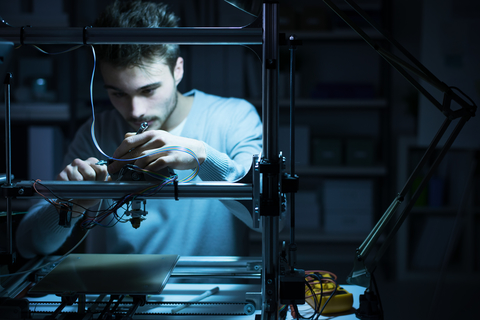Launch of first medically approved 3D printed bionic arms

Open Bionics has launched the world’s first medically certified 3D printed artificial arms for amputees.
After working with NHS England on the first trial of a wearable 3D printed medical device for children and young people, Open Bionics are ready to launch the device commercially in the UK. The Hero Arm, an advanced bionic arm, is small enough to fit children as young as nine for the first time. Current bionic limbs are sized for teenagers and adults. The University of the West of England reports this is the first time anyone with a below elbow amputation can buy a 3D printed artificial arm in the UK. The UK is the only country in the world to have these devices available, with Open Bionics planning a US launch at the close of 2018.
One of the company’s youngest users is Cameron Millar, aged ten. Cameron was born without a hand and has already used his new 3D printed bionic arm to try archery for the first time. Cameron, who was fitted by the clinic HCi Viocare in Glasgow, said “I absolutely love my Hero Arm, it’s the one prosthetic that I have used more than any other device I’ve tried. It’s lighter, it moves better, and is way cooler than any of my previous prosthetics.”
Another user who was fitted with one of the company’s first prototype bionic limbs is twelve year old Tilly Lockey. Tilly was just a baby when she lost both hands to meningitis, and was fitted with her new 3D printed hands by the clinic, Dorset Orthopaedic.
Sarah Lockey, Tilly’s mum, said “The day Tilly lost her hands, I made a promise to her that I would get her hands back. Working with Open Bionics on Tilly’s new hands has been incredible. The technology has come such a long way since Tilly was a baby. We were essentially told it was impossible to get her bionic hands because the technology was too big and couldn’t be shrunk down for her. It has been incredible to watch Open Bionics. What they are developing, a lot of kids want. What went from a sad state of prosthetic design came this explosion; a 3D printed device that was lighter, cheaper, a very stylish design that helped Tilly play with the Wii for the first time without having to sellotape the controller to her arm. She can brush her own hair with it and paint one handed. Things that we all take for granted. The design has been carefully considered to stop kids from getting bored. Tilly’s favourite feature is that it has interchangeable covers and she can match them with her outfits. Open Bionics has created a hand that my 12 year old wants to wear and has fun with. It helps her with everyday life and it looks great too.”
The award winning company has built a reputation for building bionic limbs from the world of science fiction. It developed its technology at BRL’s business incubator before relocating to the neighbouring Future Space innovation centre at the University of the West of England’s Frenchay campus. In 2017 Open Bionics won a Guinness World Record for fitting an amputee with the world’s first bionic arm built from a video game, the popular gaming title Deus Ex.
NHS England was the first healthcare system in the world to deliver 3D printed bionic hands to patients as part of a study with Open Bionics in 2017.
Co founder of Open Bionics, Samantha Payne, said “We’re incredibly excited to launch the Hero Arm after spending four years working with amputees and healthcare professionals to develop a device that is advanced and low cost. We’re particularly proud of our collaboration with NHS England and look forward to working together to make these devices suitable and available for NHS patients.”
Joel Gibbard, co founder and CEO, said “The limb different community has been absolutely amazing in their support of us developing the Hero Arm. Huge thanks goes to the parents of young children who need bionic limbs for their patience and tireless enthusiasm for our work. They have been a huge motivation.”
Open Bionics ultimately hopes to have the devices made available to NHS patients. The company is currently in the planning stages of a medical trial to assess the suitability of the device for NHS standards with a group of patients across three NHS clinics.








